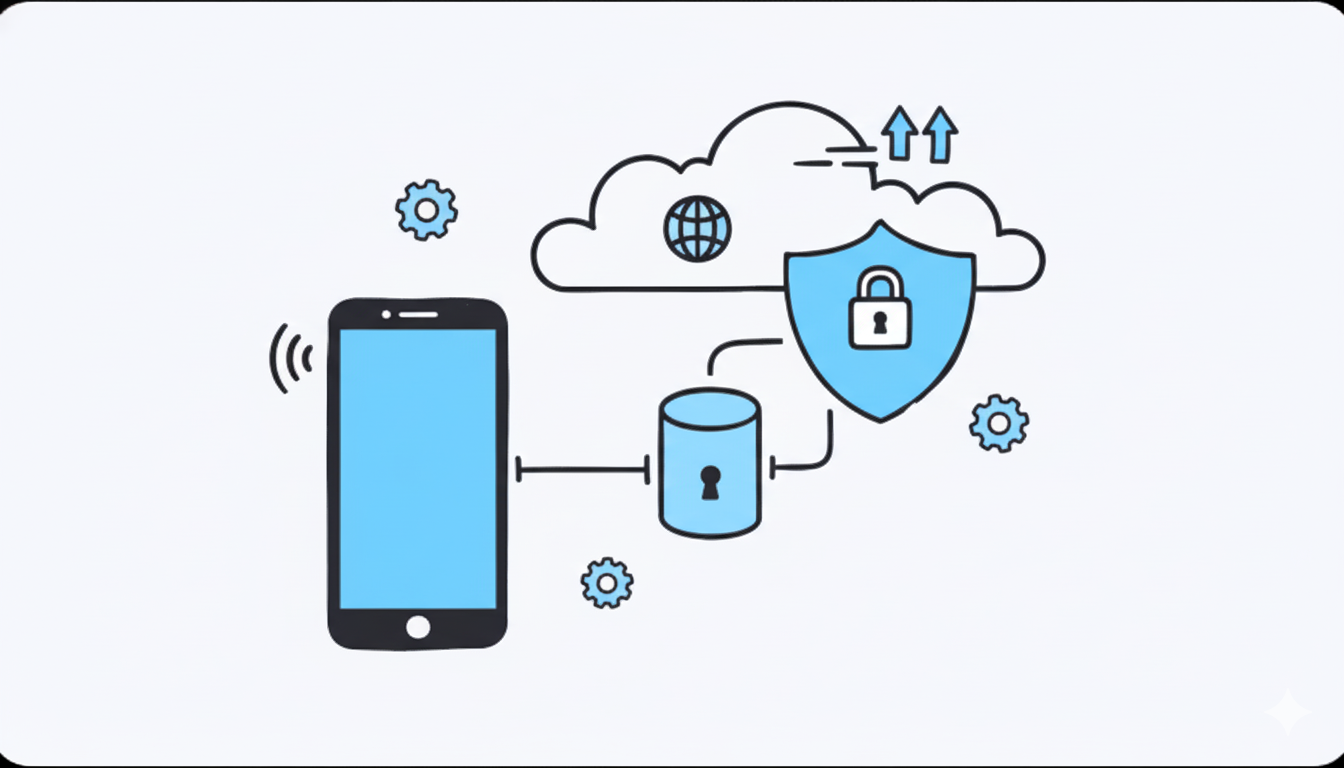.png)
What is IP Address Masking in 2025? Hide Your IP

IP address masking is a game changer for online privacy. It allows users to conceal their true digital identities, effectively shrouding their online movements. But here's the kicker: despite the incredible capabilities that come with masking—like protecting your personal data and providing access to restricted content—many people are still unaware of its critical importance. With studies predicting that by 2025, VPN usage for IP masking will soar due to escalating privacy concerns, the buzz surrounding this topic is set to intensify. Get ready to dive into the world of IP masking and discover how it can safeguard your digital presence.
What is IP Address Masking?
In the complex digital landscape, IP address masking has emerged as a critical technique for protecting online privacy and security. Your IP address is essentially your digital fingerprint - a unique identifier that reveals your precise location, internet service provider, and potentially exposes you to various online risks.
Understanding the Basics of IP Address Masking
IP address masking is a sophisticated privacy protection method that replaces your original IP address with a different, anonymized address. Think of it like wearing a digital disguise that prevents websites, trackers, and potential cybercriminals from identifying your true online identity. NordLayer defines this process as creating a protective shield around your online activities, effectively concealing your real-world location and digital footprint.
The fundamental purpose of IP masking goes beyond simple anonymity. It serves multiple critical functions:
- Privacy Protection: Prevents unauthorized tracking of your online movements
- Security Enhancement: Reduces risks of targeted cyber attacks
- Geographical Flexibility: Allows access to geo-restricted content
Technical Mechanisms of IP Address Masking
Modern IP address masking typically involves several sophisticated techniques. Virtual Private Networks (VPNs) represent the most prevalent method, creating an encrypted tunnel that routes your internet traffic through remote servers. Research from cybersecurity experts indicates that by 2025, VPN usage for IP masking is expected to dramatically increase, reflecting growing privacy concerns.
Other methods include proxy servers, which act as intermediary servers between your device and the internet, and the Tor network, which provides multi-layered anonymization by routing your connection through several global nodes. Each technique offers unique advantages, allowing users to choose the most appropriate approach based on their specific privacy requirements.
Practical Implications and Considerations
While IP address masking provides substantial benefits, it's crucial to understand its practical implications. Not all masking methods offer identical levels of protection. Some might slow down your internet connection, while others could potentially compromise your data if not selected carefully. Professional cybersecurity experts recommend selecting reputable, well-established IP masking solutions that prioritize both performance and security.
For digital professionals like cybersecurity analysts, data scrapers, and web managers, IP address masking isn't just a privacy tool - it's a strategic necessity. By obscuring your digital identity, you gain the ability to conduct research, monitor competitive landscapes, and protect sensitive operational data without revealing your true network origin.
Ultimately, IP address masking represents more than a technical procedure; it's a proactive approach to maintaining digital autonomy in an increasingly surveilled online environment. As internet privacy continues to evolve, understanding and implementing robust IP masking strategies will become increasingly critical for individuals and organizations alike.
Why Mask Your IP Address?
In today's hyper-connected digital ecosystem, protecting your online identity has become more critical than ever. IP address masking isn't just a technical luxury - it's a fundamental strategy for maintaining personal and professional digital security in an increasingly complex internet landscape.
Protecting Personal Privacy
Your IP address is far more than a random string of numbers; it's a digital beacon that reveals sensitive information about your online activities and physical location. MIMIQ research demonstrates how sophisticated tracking systems can exploit IP addresses to compile comprehensive user profiles, potentially compromising personal privacy.
The risks associated with exposed IP addresses are multifaceted:
- Location Tracking: Reveals your precise geographical location
- Online Profiling: Enables detailed behavioral tracking
- Targeted Advertising: Allows aggressive marketing strategies
Cybersecurity and Digital Defense
IP address masking serves as a critical defensive mechanism against numerous cyber threats. Cybersecurity experts emphasize that masked IP addresses significantly reduce the risk of targeted attacks, including:
- Distributed Denial of Service (DDoS) attacks
- Sophisticated phishing attempts
- Unauthorized network intrusions
Professional cybersecurity analysts recognize IP masking as a fundamental layer of digital protection. By obscuring your true network identity, you create an additional barrier that makes it substantially more challenging for malicious actors to target your digital infrastructure.
Professional and Strategic Advantages
Beyond personal security, IP address masking offers strategic advantages for digital professionals. Data scrapers, market researchers, and cybersecurity experts frequently utilize IP masking to conduct sensitive research, monitor competitive landscapes, and protect proprietary information.
For international businesses and remote teams, IP masking provides crucial benefits:
- Bypassing Geographical Restrictions: Access region-locked content and services
- Competitive Intelligence: Conduct market research without revealing organizational identity
- Secure Remote Work: Protect sensitive corporate network communications
Moreover, the technological landscape continues to evolve. Recent studies indicate that advanced IP masking techniques like those developed in MIMIQ can now change IP addresses within individual network connections, offering unprecedented levels of privacy and security.
It's crucial to understand that IP address masking is not about hiding illicit activities, but about asserting control over your digital presence. In an era where data has become a valuable commodity, protecting your online identity is not just a choice - it's a necessity. Whether you're a cybersecurity professional, a digital marketer, or an everyday internet user, understanding and implementing robust IP masking strategies represents a proactive approach to maintaining digital autonomy and security.
Common IP Address Masking Methods
In the digital age, multiple sophisticated techniques have emerged for masking IP addresses, each offering unique advantages and addressing different privacy and security needs. Understanding these methods empowers users to select the most appropriate approach for their specific online requirements.
Virtual Private Networks (VPNs)
Virtual Private Networks represent the gold standard of IP address masking. Research from cybersecurity experts reveals that leading VPN providers like ExpressVPN, NordVPN, and SurfShark now operate extensive global networks spanning over 100 countries. These services create encrypted tunnels that route your internet traffic through remote servers, effectively replacing your original IP address with a new, anonymized one.
Key benefits of VPN IP masking include:
- Comprehensive Encryption: Protects entire internet connection
- Global Server Network: Choose IP addresses from multiple countries
- Enhanced Privacy: Prevents direct tracking of your original location
Proxy Servers and Tor Network
Proxy servers offer an alternative IP masking method, acting as intermediary systems between your device and the internet. Crawlbase research highlights their particular utility for web scraping and data collection activities. Unlike VPNs, proxies can be more specialized, with different types including:
- Residential Proxies: Use IP addresses from real residential networks
- Datacenter Proxies: Provide faster, though less anonymous connections
- Rotating Proxies: Automatically switch IP addresses
The Tor network provides an additional layer of anonymity by routing your connection through multiple global nodes. Each node only knows the immediately preceding and following connection points, creating a complex anonymization process that makes tracking extraordinarily difficult.
Alternative IP Masking Techniques
Beyond primary methods, several additional strategies exist for changing or obscuring your IP address. Crawlbase experts suggest techniques like switching between Wi-Fi and mobile networks, though these methods offer limited protection compared to more robust solutions.
Mobile data networks provide a quick, temporary IP address change, but come with significant limitations:
- Limited Security: Less protection than encrypted methods
- Data Caps: Potential restrictions on usage
- Inconsistent Anonymity: IP changes are not guaranteed
Professional cybersecurity analysts recommend combining multiple IP masking techniques for maximum protection. For instance, using a VPN in conjunction with browser-based privacy tools can create multiple layers of digital anonymity.
It's crucial to recognize that no single IP masking method offers absolute protection. The most effective approach involves understanding the strengths and limitations of each technique, then selecting a strategy aligned with your specific privacy and security requirements. Whether you're a data professional, cybersecurity expert, or privacy-conscious individual, the right IP masking method can significantly enhance your online privacy and security posture.
IP Address Masking and Online Risks
While IP address masking offers robust privacy protection, it simultaneously introduces a complex landscape of potential risks and ethical considerations. Understanding these nuanced challenges is critical for digital professionals and privacy-conscious users seeking to navigate the delicate balance between anonymity and responsible online behavior.
Legal and Ethical Implications
IP address masking exists in a complex legal and ethical gray area. Anura's cybersecurity research highlights that while the technique itself is not inherently illegal, its application can potentially violate terms of service for various platforms. Some digital environments consider aggressive IP masking a potential red flag for suspicious activities.
Key ethical considerations include:
- Platform Compliance: Potential violation of website usage agreements
- Intentional Misrepresentation: Risk of being perceived as engaging in deceptive practices
- Jurisdiction Variations: Different legal interpretations across global regions
Network Security and Potential Vulnerabilities
Synchronet network experts emphasize that while subnet masks are crucial for network segmentation and security, improper IP masking can introduce significant vulnerabilities. Cybercriminals might exploit poorly implemented masking techniques to conduct sophisticated attacks.
Potential network security risks associated with IP masking include:
- False Sense of Security: Believing masked IP provides complete anonymity
- Potential Malware Exposure: Some masking tools might introduce additional security risks
- Incomplete Anonymization: Leaving metadata or other identifying information exposed
Advanced Threat Landscape
Modern cybersecurity challenges extend beyond simple IP address identification. Dipolnet network security research reveals that sophisticated tracking mechanisms now employ multi-layered identification techniques that can potentially circumvent basic IP masking strategies.
Advanced tracking methodologies include:
- Browser Fingerprinting: Identifying users through unique browser configurations
- Cookie Tracking: Maintaining user profiles across multiple sessions
- Advanced Metadata Analysis: Extracting identifiable information beyond IP addresses
For cybersecurity professionals and digital privacy advocates, understanding these risks is paramount. IP address masking should be viewed as one component of a comprehensive digital privacy strategy, not a standalone solution. Implementing robust security practices, maintaining updated software, and remaining vigilant about emerging tracking technologies are equally crucial.
While IP masking provides significant privacy benefits, it is not an infallible shield. Users must approach digital anonymity with a nuanced, informed perspective, recognizing both its powerful protective capabilities and potential limitations. The key lies in strategic implementation, continuous education, and a proactive approach to managing one's digital footprint.
Protect Your Digital Footprint with SimplyNode
In a world where your IP address exposes your every move, the importance of IP address masking cannot be overstated. The article highlights how your IP is a digital fingerprint, revealing your location and making you vulnerable to tracking, profiling, and potential cyber threats. As we head into 2025, the surge in privacy concerns means that masking your IP address has transitioned from an option to a necessity.
That's where SimplyNode comes in. With our premium residential and mobile proxies, you can confidently disguise your online identity while enjoying seamless access to geo-restricted content. We provide the essential tools to reinforce your privacy and ensure your browsing experience remains secure. Don't wait for your data to be exploited; take proactive steps to safeguard your digital presence.


%20(91).png)
%20(90).png)
%20(90).png)
%20(89).png)
%20(88).png)
%20(87).png)
%20(86).png)
%20(85).png)
%20(84).png)
%20(83).png)
%20(82).png)
%20(81).png)
%20(80).png)
%20(79).png)
%20(78).png)
%20(77).png)
%20(76).png)
%20(75).png)
%20(74).png)
%20(73).png)
.png)
.png)
.png)
.png)
.png)
%20(72).png)
%20(70).png)
%20(68).png)
%20(66).png)
%20(64).png)
%20(63).png)
%20(62).png)
%20(60).png)
%20(59).png)
%20(58).png)
%20(57).png)
%20(52).png)
%20(51).png)
%20(49).png)
%20(48).png)
%20(46).png)
%20(45).png)
%20(44).png)
%20(43).png)
%20(42).png)
%20(41).png)
%20(40).png)
%20(37).png)
%20(36).png)
%20(35).png)
%20(33).png)
%20(32).png)
%20(30).png)
%20(29).png)
%20(27).png)
%20(26).png)
%20(25).png)
%20(24).png)
%20(22).png)
%20(21).png)
%20(20).png)
%20(19).png)
%20(18).png)
.svg)
%20(17).png)
%20(16).png)
%20(15).png)
%20(14).png)
%20(11).png)
%20(10).png)
%20(9).png)

%20(7).png)
%20(6).png)
%20(5).png)
%20(4).png)
%20(3).png)
%20(2).png)
.png)
.png)
%20(1).png)
.png)
.png)
.png)
.png)
.png)
.png)
.png)
.png)
.png)
.png)
.png)
.png)
.png)
.png)
.png)
.png)
.png)
.png)
.png)
